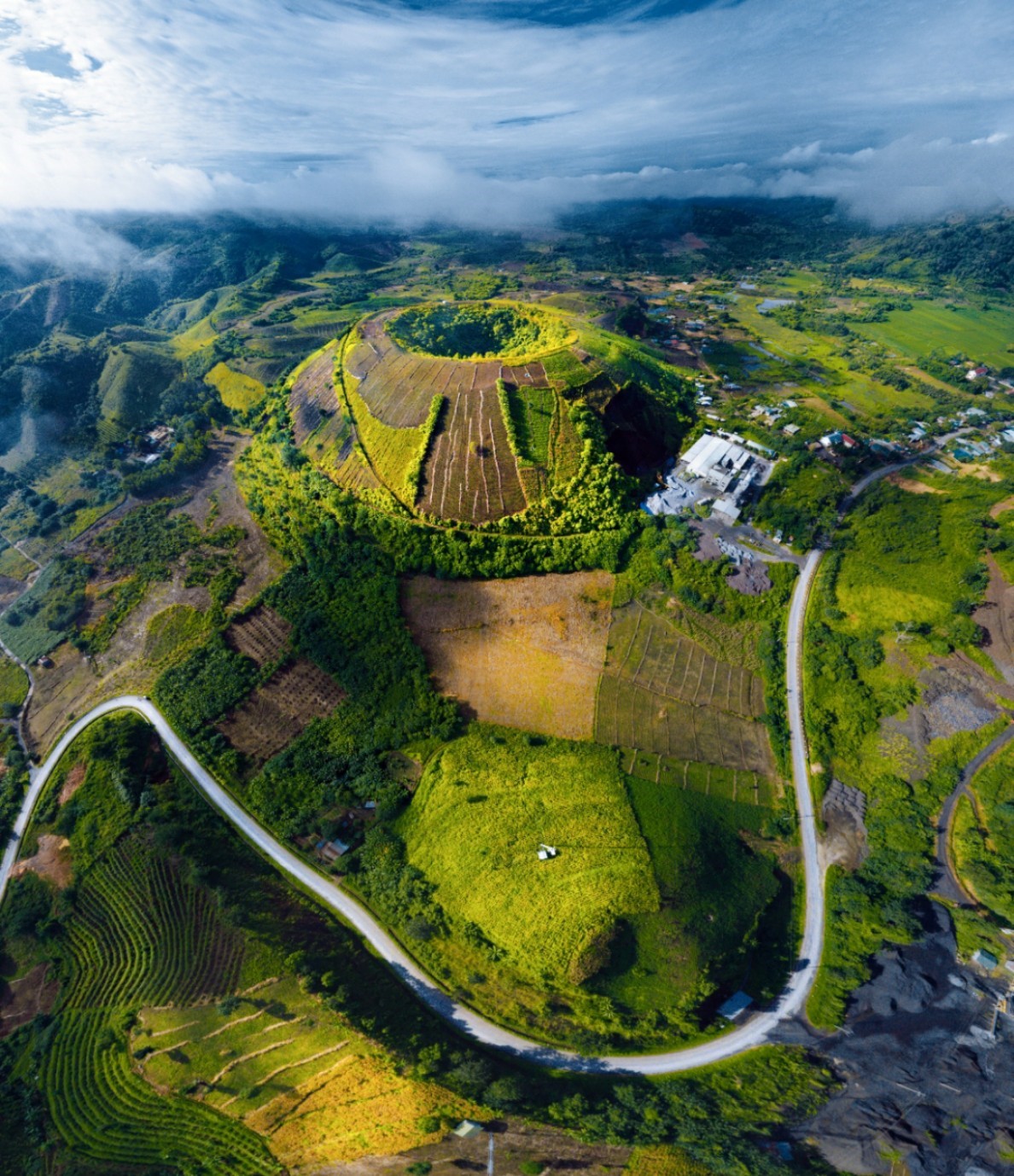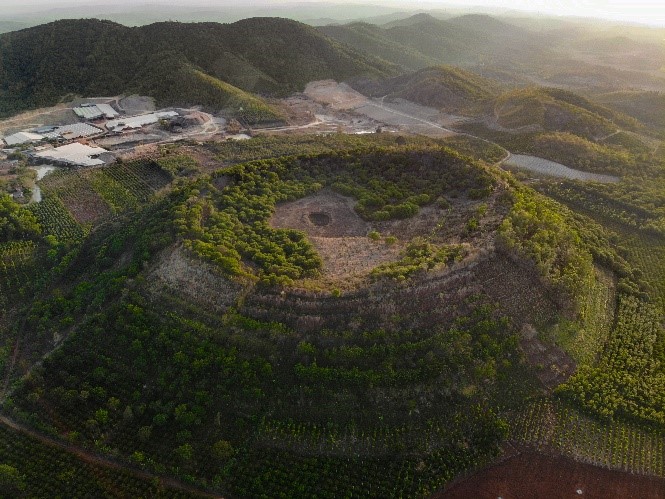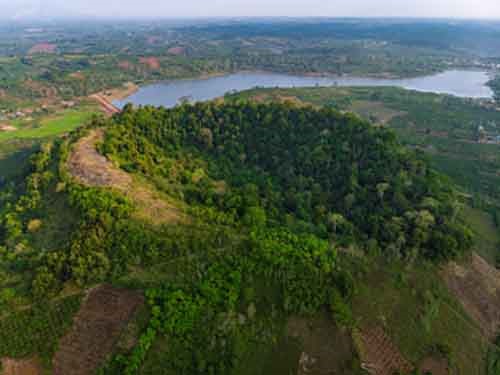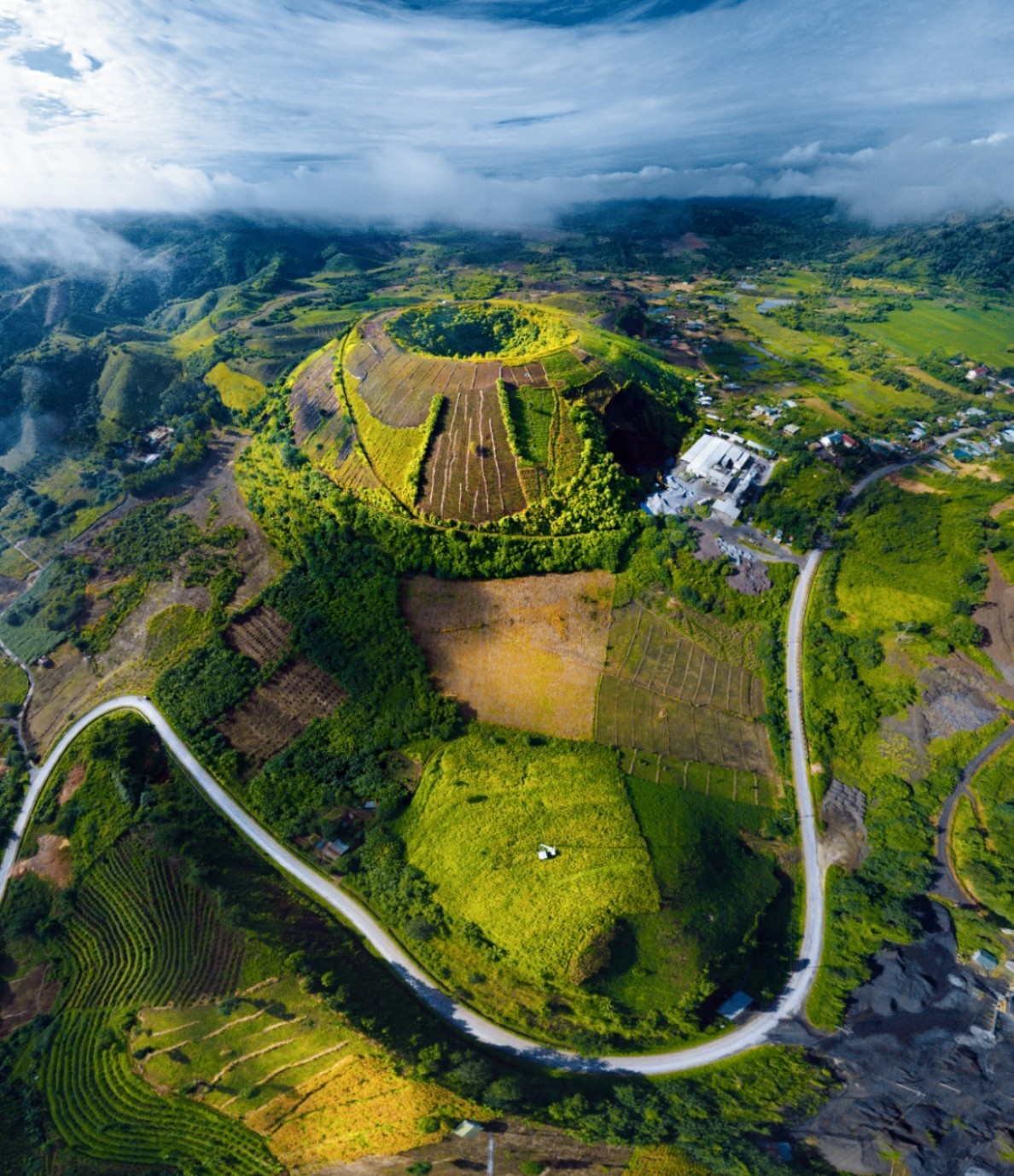
For thousands of years, volcanoes have been widely known for their destructive power but little does people know that it also contains the source of the universe's renewable energy. As molten lava aggressively swept across the surface of the earth, it burnt everything along the way, at the same time, provided the quintessential nutrition lava from deep within the earth for new green lives.
The volcanic eruptions are believed to shape the topography of the earth's surface as it is today. Interestingly, without traveling long way to Indonesia, Japan or Hawaii, tourists have chances to observe the beauty of volcanoes right in Dak Nong Geopark on poetic M'nong plateau, Vietnam.
According to the scientists, there are 5 volcanoes within Dak Nong UNESCO Global Geopark (Dak Nong UGGp), including craters and caldera to save the Earth's history tracing this land.
Nam Blang volcano (Chu R'luh volcano)
Located in Krong No district, Nam Blang volcano, previously known as Chu R'luh volcano, is one of the most breathtaking volcanos in the Central Highlands. The volcano has a distinctive and spectacular conical frustum shape that visitors can admire from both near and far. From about 0.689 - 0.199 mya, Nam Blang was active numerous times with eruptions went through many phases (in the same period).
Nam Blang is of the typical central eruption. Noticeably, this is the only volcano in Dak Nong UGGp producing a spectacular cave system of the greatest scale and uniqueness in the Southeast Asia, containing many interesting things that need to be further researched and decoded.
In addition, a large number of prehistoric artifacts were found inside some lava tube caves has added more credits to scientific, educational and geological value of this oustanding geosite.
Bang Mo volcano (Ea Tling volcano)
Bang Mo Volcano (former name was Ea T'Linh) is at Ea T'Linh town, Cu Jut district. This is a young volcano of typical central eruption, dating back from 200.000-600.000 years ago.

Bang Mo volcano
Bang Mo volcano is well preserved with a relatively round and sharp profile, at c.407m asl, 242m in diameter, 40m in height and sloping 15o. Scoria, spatter, ash, bomb and lava could be found scatteredly on the crater surface.
For hiking to this crater, it takes only about 30 minutes. Thanks to its gentler slope, it is suitable for tourists of all age to do this outdoor activity. From a stop on the crater, looking far away, visitors can embrace the whole space of a peaceful and prosperous town.
Bang Mo volcano promises to be an interesting and new destination for tourists from all over the world.
Nam Gle volcano (Thuan An volcano)
In Dak Mil, Nam Gle crater is one of the young volcanos in the Central Highlands. Its shape is totally different from others within Dak Nong UGGp.
The volcano has an oval shape extending into a narrow channel, the lowest part of the volcano creates a deep and narrow trench that stretches along the NE-SW fault line. From above, Nam Gle volcano looks like two sea shell pieces nested together. It has beautiful appearance of explosive fissure eruption.

Nam Gle volcano - Photo: Vo Anh Tu
Nam Gle volcano was last active about 781,000 - 126,000 years ago. Near the foot of the volcano is a large and beautiful natural lake that might have been formed during the active time of the volcano.
Nam Dong caldera
Located in Cu Jut district, Nam Dong is the Dak Nong UGGp's third largest volcano with breathtaking views.
This crater has a funnel shape with the relatively indistinguishable height from its surrounding landscape. It is a shield volcano with large basaltic distribution and very little volcanic ash. Thus, Nam Dong is considered as caldera since its morphology cannot be clearly distinguished from afar observation (within 1 to 2 km radius).
Nam Dong volcano's last eruption happened around 0.401 ± 0.17 million years ago. The funnel shape of the crater is evidence of the volume shrinkage and subsidence following the principle of gravity balance immediately after the ceasing of eruptions.
Nam Kar volcano cluster
Located in Krong No district, bordering Quang Son commune, Dak Glong district, Nam Kar is considered the most stunning crater in Dak Nong UNESCO Global Geopark.
The activities of this volcano occurred from 5.3 to 0.78 million years ago, representing the typical central explosive eruption mechanism. Along with the main crater, there are 2 other sub-craters characterized by the erupting-from-central-vent type. Moreover, tree mold found here are also scientific evidence of the mechanism and environment of the volcanic cone formed by this volcano.

Nam Kar volcano cluster - Photo: Vo Anh Tu
This volcano is quite small but together with "satellite" - the sub-crater and cinder cone nearby – this creates the unique formation, structure and episodic nature to form the most magnificent scenery of Dak Nong UNESCO Global Geopark.
Bach Van